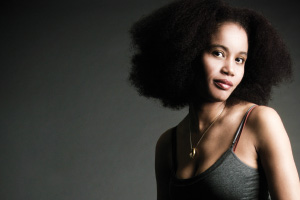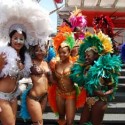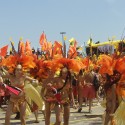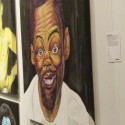Staceyann Chin’s Memoir Recounts Troubled Childhood in Jamaica
She’s been called the poet, the performer, the lesbian and the political activist. In every realm, Staceyann Chin remains the woman who for years has raised her voice about struggles to just be. The venues of expression for this Brooklyn artist are layered and they make a long-running list. Poetry spots, newspapers, off-Broadway theatre, magazines, university campuses, prime-time television profiles and even one Danish documentary in which she was featured as an Asian woman poet.
Each of Chin’s appearances reveal why a memoir was waiting to be written. That book, The Other Side of Paradise (Scribner) is Chin’s telling of her childhood in Jamaica, a country of abundant natural beauty, yet a place where her emergence was often stifled by other people’s shortcomings. By August of 1997, she took flight, and looked forward to her arrival in New York City, a much-imagined safe haven.
“Jamaica is still home. There are ways to move safely there, but it’s just harder to live there, so that’s why I left,” says Chin, sitting on a bench under the hot sun at Trinity-Bellwoods Park. It’s a Sunday afternoon of sharing with Toronto’s Gays and Lesbians of African Descent (GLAD), one day after her well-attended reading and book signing hosted by Toronto Women’s Bookstore.
“I don’t think I started out thinking I was going to write a memoir. I actually came to the US in order to find the freedom and safety to be a lesbian who lived in an out kind of way. And I don’t know if I imagined America — New York — as a sort of utopia,” says Chin. “And I got there and so much was wrong. So many things were askew, so many people were still oppressed and I was more racialized in America. So I needed somewhere to put all of those unresolved issues.”
The Other Side of Paradise relays how, as a child growing up in Montego Bay, Chin managed her unspeakable secrets through quiet determination and infuriating wit. With resolve, she carried what she believed were her crosses: an abstruse mother who abandoned her twice for life in Canada, a Chinese-Jamaican father who discarded his paternal identity, and abuse at the hands of people resentful for taking her in. Then there were the twisted hands of men trying to force their ways with her. Chin endured. She internalized much before finding the courage to convert everything bad that had happened into something else, something that would take her far. Writing about the unflattering truths of people interwoven in her history — including her beloved grandmother, to whom she credits all of her success — seemed a natural evolution, she says.
Though she’s been back to Jamaica a few times, a trip in May was noteworthy. In the past, she says, people focused on her lesbianism. “I think this time I went home and could focus more on parts of the story that were about me being a little girl without parents, and navigating family as a child without any family.”
Originally published in Sway Magazine Fall 2009
Befriend Sway on Facebook
Sway with us on Twitter



 (3 votes, average: 4.67 out of 5)
(3 votes, average: 4.67 out of 5)



Leave your response!